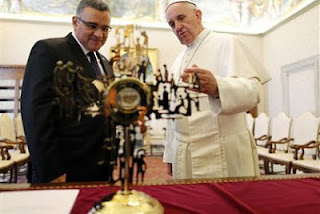The case of Beatriz resolves
El Salvador has one of the strictest abortion laws in the world, allowing no exceptions for rape, incest or the health of the mother. Mothers can be, and are, sent to prison for as many as 30 years for having an abortion. El Salvador's Supreme Court refused yesterday to vary from that strict law in the case of Beatriz, a woman who needs to terminate her pregnancy to save her own life. But her life may still be saved, as this AP report in the Miami Herald describes: A seriously ill Salvadoran woman whose struggle to get a medical abortion drew international attention received permission on Thursday to end the troubled pregnancy with a cesarean section. El Salvador's Health Minister on Thursday approved the C-section for the 22-year-old woman suffering from kidney failure and lupus, a day after the Supreme Court ruled that she could not have an abortion despite her lawyers' appeal that the pregnancy was life-threatening. Ultrasoun...
